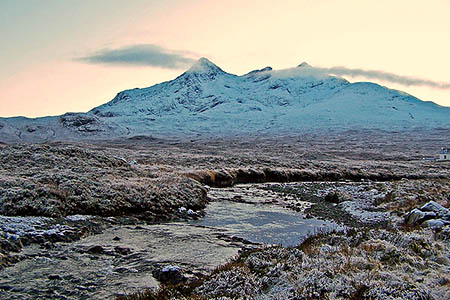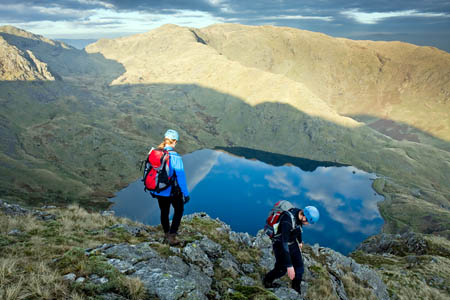The body that oversees mountaineering qualifications in the UK has revealed that the man who died on the Skye Cuillin two years ago while leading a novice had no formal qualification.
Following a fatal accident inquiry into the death of Graham Paterson, Sheriff Derek Pyle recommended the Scottish Government should consider regulating mountain guides.
He also said those taking part in activities in the hills should be instructed in what to do if their leader had an accident.
Mr Paterson was leading teacher Ildiko Kerek who had hired him for a walking trip on the Cuillin. But he fell while the pair were tackling a grade IV climb in winter conditions. Ms Kerek had no previous experience on technical climbing routes.
Mountain Training UK, based in Capel Curig, north Wales, responded to the sheriff’s recommendations this week.
It pointed out that, while Mr Paterson had been described as a mountain guide, the term has a specific meaning with regard to mountaineering qualifications and the Carbost-based mountaineer did not have any of its formal qualifications.
In a statement, MTUK chair Owen Hayward said: “Our sincere sympathies go to Mr Paterson’s wife and family for their loss while also acknowledging the harrowing experience of his client.”
He explained some of the definitions used in UK mountain training. Mr Hayward said: “The terms Guide, Instructor and Leader have specific meaning with regard to mountaineering qualifications.
“Each one defines a particular range of activities that an individual has demonstrated competence in.
“Summer and winter are also key words in defining the scope of qualifications with the latter requiring further assessment in a range of additional competences.
“Mr Paterson had begun the process of registering for the first level of summer qualification for leading in the mountains, the Mountain Leader Award, but he did not hold any qualification issued by Mountain Training.”
The Mountain Leader Award is a hillwalking qualification for those who can show competence in leading groups when ‘winter’ conditions, such as when ice-axe and crampons are necessary, are not affecting the route. Both Mr Paterson and Ms Kerek were using ice-axes in Coire na Banachdich when he fell.
Mr Hayward said: “Regarding the need for qualification, Mountain Training’s aim is to educate and train people in walking, climbing and mountaineering activities and over a 50-year period we have developed a hierarchy of mountaineering leader and instructor qualifications which we strongly recommend to all those interested in leadership – voluntary or professional – and to those seeking to engage leaders, instructors and guides.
“Our qualifications are the result of considerable deliberation on the range of skills needed to operate competently and safely in the mountains. Mountain Training’s qualifications are the benchmarks for those who work with the public and are recognised as such by government and across the adventure activity sector.”
But he pointed out that formal qualifications are not the only mark of competence in mountain activities.
“We support the Health and Safety Executive’s view that there are several ways for activity leaders to demonstrate their competence,” he said. “We believe that our qualifications, the supporting professional associations and their continuing professional development processes contribute to a largely self-regulated sector which is generally acknowledged to be ‘safe’.
“We have actively contributed to the development of accreditation systems, both statutory and sector-led and expect to launch a further system of ‘Adventuremark’ accreditation for ‘micro-providers’ through our Mountain Training Association in 2015.”
The HSE acknowledges that both local qualifications and experience can be used to demonstrate competence.
Mr Hayward also said that the accident in December 2012 on Skye and the recommendations of Sheriff Pyle should prompt leaders to think about what might happen if they have an incident in the mountains.
He said: “The Sheriff’s account of this incident is a salutary reminder to all leaders to consider carefully how much to involve all participants.
“It has been the custom and practice of our leaders over the last 50 years to work alone, as often as not with a single client, and all to great effect; whether that be achieving a particular objective or intense training in a particular skill.
“Nevertheless this incident reminds everyone that roles can be reversed and in that case the more informed and better equipped the participants are then the greater the chance of a successful outcome should an accident occur.”
Sheriff Pyle said in his determination that the Scottish Government should consider regulating mountain guides.
The sheriff, himself an experienced hillwalker, said ‘consideration should be given by Scottish Government and relevant stakeholders to discovering a means, whether statutory or otherwise, to ensure that mountain guides in Scotland are properly qualified and equipped to provide a commercial mountain guiding service for adults’.
Although commercial trekking and climbing activities for the under 18s are covered by legislation covering competence, there is no legal requirement for those leading and instructing adults in the UK to have relevant qualifications.
Sheriff Pyle said: “It seems to me that it is incumbent on policy-makers to discover a means by which mountain guides in Scotland are properly qualified and equipped to provide the service which they promote and which they operate for commercial gain.”
Mountain Guide is the highest qualification under Mountain Training UK’s schemes, and candidates must have extensive rock-climbing and winter climbing experience, with at least 50 climbs of a certain difficulty in each, as well as 20 Alpine summits and ski-mountaineering trips.


Peter Evans
20 December 2014While agreeing with many of the points made, it should be remembered that these incidents are extremely rare. Indeed, a similar scenario could have arisen with a qualified guide.
Mike
23 December 2014Having read the sherrifs full judgement and now this, there does seem to be a real case for some form of legal licensing as there is for those leading under 18s in the mountains. Yes the poor man clearly made some mistakes and paid a terrible price, but it was very nearly a double tragedy. I think the point is that if someone plies his or her trade as a 'mountain guide' then then they should have the requisite formal professional qualification. And one of the skills needed is disaster planning. The poor woman who was with him had no map or compass, did not know the route, had no means of communication and very limited skills to use the equipment she had.
I believe a qualified guide would have been better trained to 'plan for the worst' The worst being - what will happen to your client if you have an accident? Even though its a rare occurrence, we shoud still try and stop it if we can and if requiring anyone acting as a guide for comercial gain to be qualified saves just one life, I'm all for it.
ildiko
05 February 2015In response to above comment about this could have happened to a qualified instructor, I dissagree. A qualified guide would (should) have shown client the route prior to
setting off as well as running through emercency proceedures
should an emergency arise and running through essential equipment. Had client
not gor down before 3:30pm (it was dusk when she got down,) had she been an extra 30 minutes- hour she would have been stumbling in a blizzard in pitch black with no lamp and there would be two bodies on the mountain. Knowing the route, having a map would have enabled the client to get down the mountain more easily, as well as enabling her to povide a location of the guide. This would not have happened had a qualified guide 'imparted' knowledge prior to trip. Teachers have to pass exams to teach, you can be a great painter and terrible teacher, teaching a pupil to paint does not mean painting for them. It means empowering them to do
it for themselves. Due to the dangers involved in the mountains I think their needs to be a switch in attitudes; being a good mountaineer doesnt make you a good guide. This tragic accident could have been avoided.
Georgina Talfana
15 February 2015Seems to me that this "guide" had an unlucky slip with harsh consequences and given that we are never truly in control of fate could have happened to any leader of any qualification/experience. Having said that what concerns me is that he took his client somewhere where she was well out of her ability and not what she had requested. This indicates that he either had an agenda of his own or was lost.
As a qualified IML myself, clients often complain when they are asked to carry safety kit and it is customary for the quide to carry it but it is wise to show the client before setting off where the kit is and how to use it. It is foolish to set off without a map but whether the client would have been able to read the map in such serious weather conditions and environment is another question - after all this is why she booked a guide!
Nonetheless it was a tragic and traumatic incident for both involved and I do believe that guides should be qualified as it sets a very good standard on a technical and leadership level.
Sean Paterson
22 September 2019I am one of 2 sons of Graham and having read this article i would like to say, my father had 20 plus years of climbing experience and was a total professional and would never knowing endanger anyone under his supervision. In these kind of environments the unknown and unexpected are always a factor like any other dangerous activitie. The title of this article saddens me as it seems like a character assassination of a very professional man, in the real world experience is far more valuable than any piece of paper, i can vouch for that personally. My father was a very caring and loving person and if whatever when wrong you can be sure was beyond his or anyone else's control.